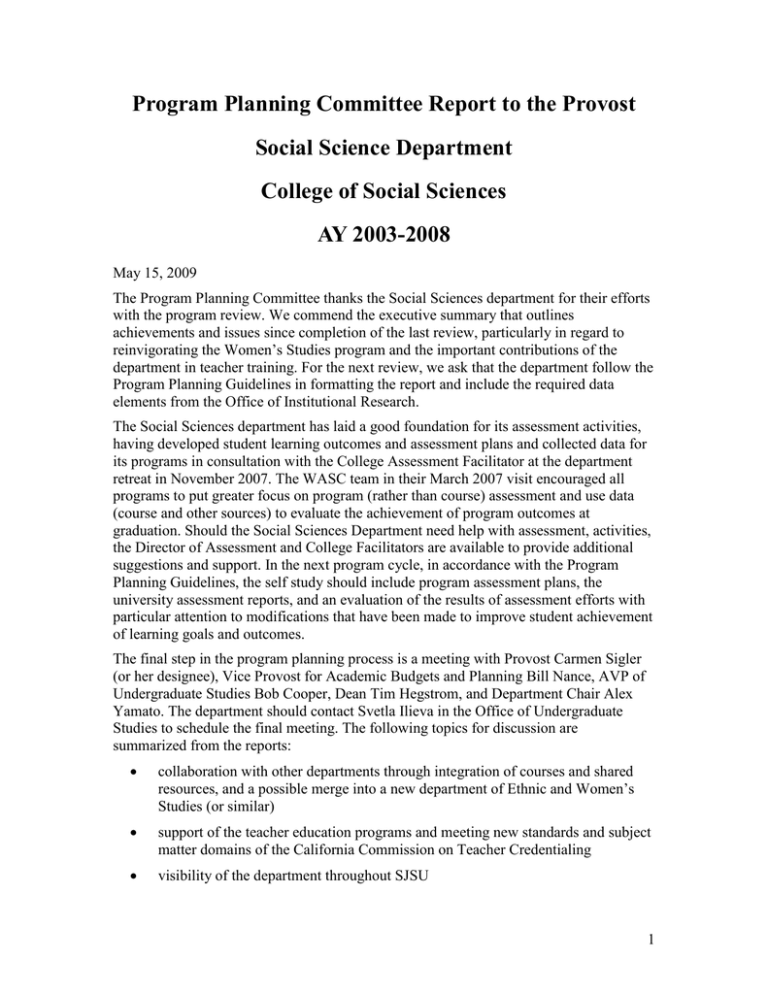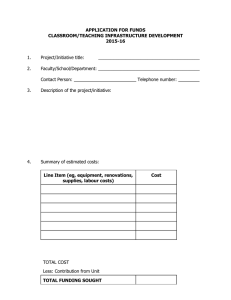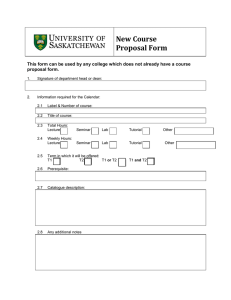Program Planning Committee Report to the Provost Social Science Department AY 2003-2008
advertisement

Program Planning Committee Report to the Provost Social Science Department College of Social Sciences AY 2003-2008 May 15, 2009 The Program Planning Committee thanks the Social Sciences department for their efforts with the program review. We commend the executive summary that outlines achievements and issues since completion of the last review, particularly in regard to reinvigorating the Women’s Studies program and the important contributions of the department in teacher training. For the next review, we ask that the department follow the Program Planning Guidelines in formatting the report and include the required data elements from the Office of Institutional Research. The Social Sciences department has laid a good foundation for its assessment activities, having developed student learning outcomes and assessment plans and collected data for its programs in consultation with the College Assessment Facilitator at the department retreat in November 2007. The WASC team in their March 2007 visit encouraged all programs to put greater focus on program (rather than course) assessment and use data (course and other sources) to evaluate the achievement of program outcomes at graduation. Should the Social Sciences Department need help with assessment, activities, the Director of Assessment and College Facilitators are available to provide additional suggestions and support. In the next program cycle, in accordance with the Program Planning Guidelines, the self study should include program assessment plans, the university assessment reports, and an evaluation of the results of assessment efforts with particular attention to modifications that have been made to improve student achievement of learning goals and outcomes. The final step in the program planning process is a meeting with Provost Carmen Sigler (or her designee), Vice Provost for Academic Budgets and Planning Bill Nance, AVP of Undergraduate Studies Bob Cooper, Dean Tim Hegstrom, and Department Chair Alex Yamato. The department should contact Svetla Ilieva in the Office of Undergraduate Studies to schedule the final meeting. The following topics for discussion are summarized from the reports: collaboration with other departments through integration of courses and shared resources, and a possible merge into a new department of Ethnic and Women’s Studies (or similar) support of the teacher education programs and meeting new standards and subject matter domains of the California Commission on Teacher Credentialing visibility of the department throughout SJSU 1 Please obtain recent data elements from the Office of Institutional Research before scheduling this meeting. If the Department would like to propose other issues for the meeting, please discuss the appropriateness of the topics with your Dean. The Program Planning Committee recommends acceptance of the plan without modification. The next program review for Social Science is scheduled for AY 20112012 with the self-study due in spring 2011. 2008 - 2009 members: CC: Debra Caires Thuy Le Pam Stacks Mary Calegari Quynh Lu Gary Stebbins Elaine Collins Bill Nance Patricia Stroh Bob Cooper Dan Perales Sutee Sujitparapitaya M. E. Fayad Annabel Prins Shailaja Venkatsubramanyan Beverly Grindstaff Lori Rodriguez Ashwini Wagle Xiaolu Hu Jackie Snell Alex Yamato, Department Chair, Social Sciences Department Tim Hegstrom, Dean, College of Social Sciences Beth Von Till, Chair, Curriculum and Research Bob Cooper, AVP Undergraduate Studies Bill Nance, Vice-Provost 2 Appendix: Summary of Program Planning Reports for the Social Science Department Overview of the Program: The Social Sciences department includes the Asian American Studies, Social Science, Social Science Teacher Education, and Women’s Studies programs. The Social Sciences program offers an interdisciplinary B.A. degree in four topical areas: Asian American Studies, Comparative Studies in Race/Ethnicity, Class and Gender; Public Service and Social Change, and Women’s Studies. Teaching credentials are available through a B.A. in Social Science, Teacher Preparations, Multiple Subject (grades K-8) and Single Subject (grades 6-12). The department also offers minors in Asian American Studies, Social Science, and Women’s Studies. After reorganization of the department in 1987, African American Studies and Mexican American Studies moved to the College of Social Work (now the School of Social Work) and became separate departments. Although the Mexican American Studies and African American Studies programs moved back to the College of Social Sciences, they continue as separate departments and are not currently included in the Social Sciences Program. In AY 2007-2008, the number of FTE faculty was 6, an all-time low for the department. Summary of Self Study (January 2008) Executive Summary: The Social Science Department was created in 1965 to provide for social science teacher education and interdisciplinary social science majors. The self study includes a detailed chronology of the faculty and development of the department’s programs and curriculum. The self study submitted in 2008 is an addendum to a report submitted in 2005 (but not included in the program review binder) and primarily responds to an external reviewer’s report from that year. The self study therefore does not follow the program planning guidelines established in 2006, but instead is organized by the following topics: Centrality to the Mission of the University The Social Science Department provides for teacher education and interdisciplinary social science majors. In response to the external review in 2005, the department took the following actions: Retreat to discuss creation of a School of Ethnic and Women’s Studies Looked at Cal Poly Pomona and other universities as models for a comparable school Request for establishing a B.A. in Asian American Studies Development of Women’s Studies toward the goal of establishing a major 3 Submission of “Single Subject Matter Standards of Quality and Effectiveness for Program in Social Science” to the California Commission on Teacher Credentialing Quality of the Instructional Program Data submitted in the self study came from student surveys and SOTEs. Overall student satisfaction with learning in Social Science courses in both major/minor (79%) and general studies (73%) agreed or strongly agreed that they would recommend the courses. Faculty worked to improve advising, with one faculty member now designated as the primary advisor. Student Demand Roughly 75% of undergraduate course offerings were in lower division, with the most popular courses being Asian American Studies 33A and 33B, Women Studies 10, and Women Studies 20 (which also meet GE requirements). According to figures reported in the self-study, the number of undergraduate majors declined from 114 in Fall 2003 to 81 in Spring 2007. From Fall 2003 through Fall 2006, the average student enrollment was 235.93 FTES per semester. [Because the self study did not include reports from the Office of Institutional Research, the Program Planning Committee cannot verify the accuracy of these enrollment figures and data on studentfaculty ratios.] Societal Need The statement of how the department fulfils a societal need remains the same as in previous reports. Financial Resource Effectiveness, Viability and Efficiency The main issues are diminishing of financial resources and loss of key faculty, not all of which have been replaced. Reduction in enrollment poses a serious threat to the department, and the reduction in faculty limits the department’s ability to respond to emerging trends in the field. Student-faculty ratios have fluctuated, with a low of 26.09 in AY 2004-2005 to a high of 31.08 in AY 2005-2006. Interdependence of Programs The department provides a range of GE courses, three minor programs, service courses for other programs (for Child Development and Mexican American Studies majors), and several cross-listed courses. Faculty served on graduate theses committees for Education, Theatre Arts, Sociology, and Art. The department recently restructured the topical majors to highlight its strengths. The faculty worked on developing a required course in California history and government for its teacher education majors and is discussing creating other courses to support the major (such as methodology and popular culture/media). 4 Capacity to Contribute to an Academic Field The activities and achievements of the six full time faculty demonstrate their many contributions to the field. Availability of Instructional Alternatives The interdisciplinary programs of the department emphasize diversity. Because the Asian American, Social Science, and Women’s Studies programs are united in one department, they are “uniquely situated to incorporate critical perspectives in race, class, and gender into general education and into teacher preparation programs.” Summary of External Evaluator’s Report (March 2008) This report was prepared by Dr. Timothy P. Fong (Director, Social Science and Asian American Studies Program, CSU-Sacramento) and Dr. Joanne Belknap (Department of Sociology, University of Colorado, Boulder. Three central questions guided the review: 1) How is the new faculty fitting in?; 2) How to expand and enhance Women’s Studies; 3) How does Social Science fit in with the rest of the college? Mission The department fulfills its mission in regard to teacher preparation and is exemplary in its diverse curriculum and faculty. However, the external reviewers recognized problems in the retention of faculty, who often left to teach at other departments on campus, and the sometimes hostile relationships with faculty in these other programs. These problems have affected the department’s efforts to submit its “Single Subject Matter Standards of Quality and Effectiveness for Programs in Social Science” to the California Commission on Teacher Credentialing (CCTC). The reviewers assess the situation as “being out of hand, excessively petty, and unbecoming of a major metropolitan university.” Recommendations: 1) Continue to pursue creation of an “umbrella” center/unit that includes MAS and African American Studies with the Social Sciences programs. 2) Develop majors in Asian American Studies and Women’s Studies 3) Look at Cal-Poly as a model for Ethnic and Women’s Studies 4) More proactive involvement of administration in fostering a culture of collegiality 5) Continue working on submitting the “Single Subject Matter Standards” to the CCTC. 6) A commitment by the administration to providing necessary resources to allow the programs to grow the number of majors (particularly in Women’s Studies). Quality of Instructional Program The quality of instruction rated very high in student surveys, though they expressed some frustration with cancelled courses due to low enrollment and the lack of respect for the major on campus. The reviews had two recommendations for improvements: 5 1) Develop a separate assessment for majors in the Subject Matter Preparation program as required by the CCTC; 2) Discuss shared advising with the College of Education for the multiple and single subject students. Student Demand Enrollments have decreased since 2003, particularly in the Asian American and Women’s Studies programs. Recommendations: 1) “Provide clear and continued assistance” to community college counselors on Social Sciences majors 2) Repeat of recommendation 1) under “mission,” creation of “umbrella” unit 3) Allow latitude in enrollment for Women’s Studies while the department recovers from loss of faculty. Societal Need The program appears to fulfill the SJSU “Curricular Priorities” for Societal Need. The reviewers recommended that the department work closely with the administration to address issues raised in the WASC report of April 10, 2007, which expressed concerns related to the University’s “inclusive excellence.” Financial Resource Effectiveness, Viability and Efficiency The reviewers commended the commitment of the faculty, the efforts to rebuild the Women’s studies Advisory Committee, and the work of the office staff in juggling many duties in this complex interdisciplinary program. Recommendations: 1) Assigned time to faculty to allow them to coordinate efforts to create an umbrella center or unit for Ethnic and Women’s Studies 2) Recruitments to replace faculty, particularly in Women’s Studies and Asian American Studies Program 3) Additional help for support staff 4) Involvement of the department in discussions regarding space issues Interdependence of Programs The reviewers commended the lower division GE courses and the department’s creativity in service courses and cross-listing courses to enhance its visibility. Recommendations: “Greater efforts by the administration to encourage other departments to cooperate with the Social Science Department, particularly with the single subject matter program. The existing single subject matter program is 66 units, but the newly developed program is 6 just 45 units. The current single subject program in the History Department is 69 units. While the proposed new program in the Social Science Department is more efficient, it may be questionable if it will meet all of the new standards and subject matter domains of the California Commission on Teacher Credentialing. The reviewers are concerned that the reduction in course offerings is a result of the lack of cooperation” with other departments. Capacity to Contribute to an Academic Field and Availability of Instructional Alternatives The reviewers commended the department in these two areas and had no recommendations. Conclusions 1) The department has a “beleaguered but highly committed faculty whom students greatly appreciate; 2) Curriculum is consistent with the University mission; 3) Concerns about diminished status of the department on campus; 4) Given importance of teacher education and preparation, more investment and support from the administration is needed Department’s Response None. Summary of College Committee Report (May 29, 2008) The committee underscored the department’s vital role in “preparing students to be engaged and informed citizens and community members with a skill set to work collaboratively to improve life in our communities” and the essential contribution of the department in teacher training. The department makes an “enormous contribution” to the university and should be highlighted by the administration so that it is more recognized across campus. Of particular concern were the lingering hostilities between the Social Sciences and History departments. The College Committee reiterated that “there is no place in the College of Social Sciences for such conflicts, and pointed to Senate Policy Recommendation S01-13, signed by President Caret on 7/19/2001. The committee concurred with many of the external reviewers recommendation and made the following recommendations: 1) Each program should have independent majors with a solid core of faculty; 2) Develop curriculum and growth plans that “are not contingent on collaborations with departments perceived as hostile.” Focus instead on its own teacher preparation certification and growth of the Asian American and Women’s Studies programs; 7 3) Continue to cross list courses, especially in the College of Business and College of Education; 4) Explore ties/mutual relationships with the “Punjabi Center’ to be housed in the Foreign Language Department; 5) Release time to help faculty develop programs, including increase of release time for the chair to .4 per semester; 6) Request that the Dean “initiate ‘crisis level’ discussion regarding the ‘broken relationship’” between the History and Social Sciences departments regarding the single subject issue; 7) The Dean’s office should “facilitate a college-wide analysis of ways to support small department through emphasizing their strengths and connecting them to other departments by way of minors and other mechanisms of complementing the curricula of these larger departments.” Dean’s Report (March 27, 2009) Dean Hegstrom praised the “nurturing group climate” of the department, the revival of the Women’s Studies program, and the faculty’s participation in book talks. He encouraged the department to move forward with integration of courses and resources with the African American and Mexican American Studies programs, with the ultimate goal of merging into a new department of Ethnic and Women’s Studies (or similar). The Dean responded in more detail to the College Committee recommendation on level of support. Since the preparation of the self study, the College has increased assigned time for the chair and program coordinators for administrative tasks, including time for program development. Regarding a “crisis level” discussion to resolve old conflicts with other departments, the Dean instead recommended focusing the discussion on “the important substantive issues” before the college. He suggests finding examples of successful collaboration and then “building a track record of further successes that could help to restore trust.” He points to important recent work with the single subject proposal before the CCTC and the small unit requirements for the Subject Matter Preparation Program. Although the Social Sciences program can develop independently from other departments, it must continue to work with others that are also responsible for delivering the teacher education curriculum in Social Science. 8



